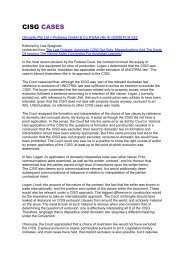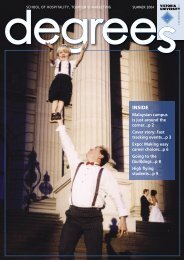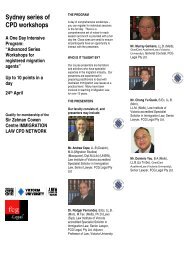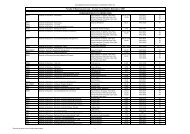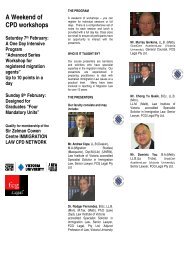A Glimpse Through the Kaleidoscope - Faculty of Business and Law ...
A Glimpse Through the Kaleidoscope - Faculty of Business and Law ...
A Glimpse Through the Kaleidoscope - Faculty of Business and Law ...
You also want an ePaper? Increase the reach of your titles
YUMPU automatically turns print PDFs into web optimized ePapers that Google loves.
LISA SPAGNOLO<br />
Table 3: Rate <strong>of</strong> <strong>Law</strong>yers Generally Opting Out 61 by cpmc <strong>and</strong> cptd<br />
Proportion <strong>of</strong> <strong>Law</strong>yers Cpmc<br />
Cptd<br />
Generally Opting Out<br />
Switzerl<strong>and</strong> 41% 22.2 1025<br />
Germany 45% 5.5 342<br />
United States <strong>of</strong> 55-71% 0.4 100<br />
America<br />
Austria 55% 16 836<br />
The „medium‟ opt-out jurisdictions <strong>of</strong> Germany <strong>and</strong> Switzerl<strong>and</strong> share high measures<br />
<strong>of</strong> dispute work exposure. The Swiss appear to have greater exposure relative to <strong>the</strong><br />
Germans, <strong>and</strong> tend to opt out less. By stark contrast, lawyers in <strong>the</strong> „high‟ opt-out<br />
U.S.A. have vastly poorer exposure to CISG dispute work. Although <strong>the</strong> correlation is<br />
not strong, we might conclude a tenuous but inverse relationship between dispute<br />
work exposure <strong>and</strong> opt-outs. The Austrian position st<strong>and</strong>s in contrast. It ei<strong>the</strong>r<br />
demonstrates weakness in <strong>the</strong> correlation itself, or it could simply be illustrative <strong>of</strong> <strong>the</strong><br />
complications discussed above, including case reporting issues. Arguably, <strong>the</strong> data<br />
provides corroborative but not conclusive evidence that higher exposure to CISG<br />
dispute work reduces <strong>the</strong> tendency to opt out.<br />
2.2.3 DOMESTIC LAW DIFFERENTIAL<br />
Perceptions <strong>of</strong> <strong>the</strong> size <strong>of</strong> start up or learning costs can be influenced ano<strong>the</strong>r way.<br />
Where domestic law has been influenced by or modelled on <strong>the</strong> CISG, lawyers might<br />
perceive costs <strong>of</strong> becoming familiar with <strong>the</strong> CISG as lower. 62 This situation exists to<br />
an increasing degree in many parts <strong>of</strong> <strong>the</strong> world, notably including China <strong>and</strong><br />
increasingly, <strong>the</strong> EU member states. 63<br />
61<br />
62<br />
63<br />
148<br />
Utilising largest/more recent sample size: For China, Koehler, M. F. <strong>and</strong> Guo, Y., “The Acceptance <strong>of</strong><br />
<strong>the</strong> Unified Sales <strong>Law</strong>” supra fn 6; for Germany, Switzerl<strong>and</strong> <strong>and</strong> Austria, Meyer, “The CISG in<br />
Attorney‟s Every Day Work” supra fn 3; for <strong>the</strong> U.S., as each <strong>of</strong> three surveys achieved similar sample<br />
sizes, see Koehler, M. F., “Survey regarding <strong>the</strong> Relevance” supra fn 1; Philippopoulos, “Awareness <strong>of</strong><br />
<strong>the</strong> CISG” supra fn 2; Fitzgerald, “The International Contracting Practices” supra fn 2.<br />
See also De Ly, F., “The Relevance <strong>of</strong> <strong>the</strong> Vienna Convention for International Sales Contracts-Should<br />
We Stop Contracting It Out” (2003) 4 <strong>Business</strong> <strong>Law</strong> International 241, at p. 244: arguing that one<br />
reason for <strong>the</strong> absence <strong>of</strong> a „general pattern excluding <strong>the</strong> CISG‟ amongst Dutch lawyers might be <strong>the</strong><br />
similarity between Dutch law <strong>and</strong> <strong>the</strong> CISG. De Ly reports that Dutch lawyers <strong>and</strong> even Dutch trade<br />
associations do not tend to exclude CISG: ibid, at pp. 244, 245 <strong>and</strong> fn. 18.<br />
The CISG has had a direct impact on domestic laws in China, Germany, Sc<strong>and</strong>inavia, Japan, Québec,<br />
Russia <strong>and</strong> Estonia. The PRC Contract <strong>Law</strong> took effect on 1 October 1999. It „absorbed rules <strong>of</strong> <strong>the</strong><br />
CISG on <strong>of</strong>fer <strong>and</strong> acceptance, avoidance (termination) with a Nachfrist, liabilities for breach [… <strong>and</strong>]<br />
interpretation‟ not only for sales, but contract generally: Han, S., “China” supra fn 6, at p. 84: citing<br />
Pr<strong>of</strong>essor Liang, <strong>the</strong> main drafter. However, some differences exist, e.g., Chinese Contract <strong>Law</strong> has no<br />
seller‟s right to cure, <strong>and</strong> fundamental breach is less strict: Han, ibid, at pp. 76 <strong>and</strong> 88. The recent reform<br />
<strong>of</strong> <strong>the</strong> German Civil Code (<strong>the</strong> Schuldrechtsreform <strong>of</strong> 2002) involved significant discussions <strong>of</strong> CISG:<br />
(2009) 13 VJ 135 - 156



